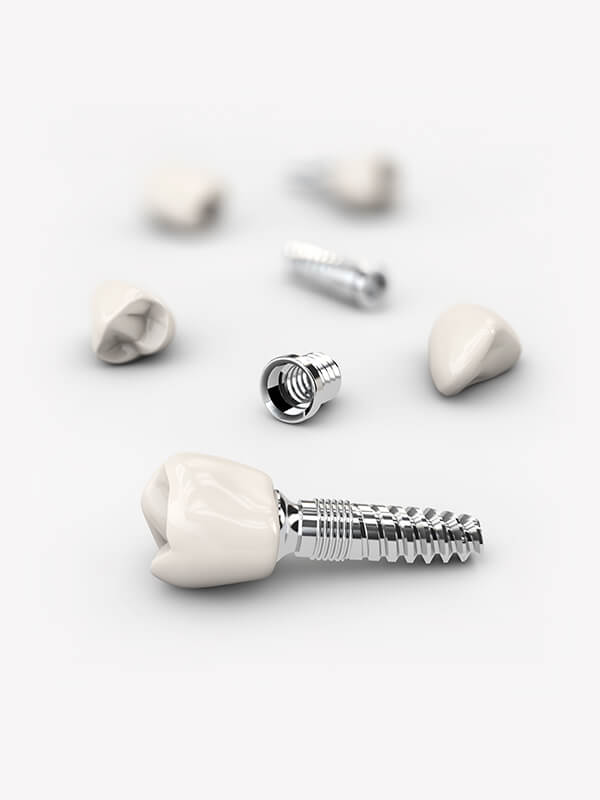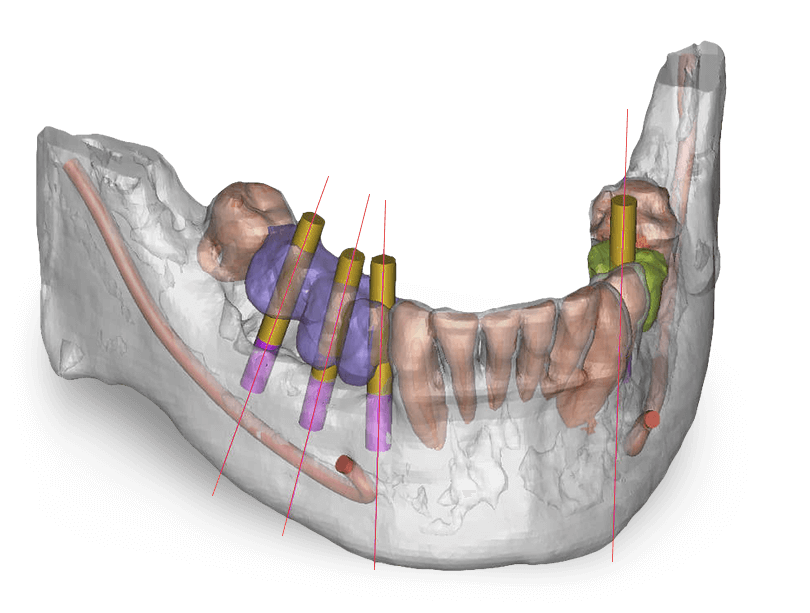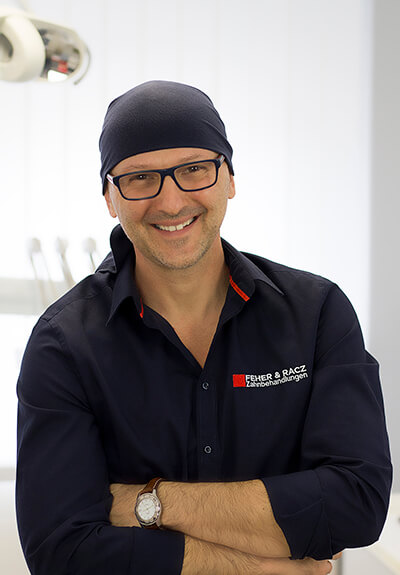Dental Implants in Hungary
Dental implants represent the best way to replace missing teeth. Implantology is also one of our main fields of expertise.
“More than 3,000 implants in more than 20 years.”
Dental implants are artificial tooth roots made of titanium that completely integrate with the surrounding bone to provide a complete replacement that can hold a crown, a bridge, or a denture.
There are a lot of advantages to dental implants. The biocompatibility of the titanium makes sure that the implant is completely integrated with the surrounding alveolare bone. This further results in a very high durability and load-bearing capacity – implants can take just as much load as a natural tooth. This means dental implants are the perfect foundation for a high-quality restoration and are able to provide protection that lasts a lifetime.

How implants are used
Single implants
Single implants can replace teeth individually without affecting other teeth. This means there’s no need to remove additional tooth substance, like for a bridge. You can also brush and floss around an implant just like your natural tooth, making everyday home care that much more successful.
Multiple implants
Multiple implants can be used to hold a high-quality restauration, such as a bridge. Compared to partials (or “removable partial dentures”), bridges are permanently anchored inside the mouth, providing a much higher level of stability and comfort.
Implant supported dentures are the perfect way to achieve maximum stability and optimal esthetics in completely edentulous patients. Thanks to the stability of the implants, typical denture symptoms such as wobbling or pressure points are virtually nonexistent. The number of required implants for an implant supported denture is determined upon evaluation of bone quantity and quality.
In good hands
We are currently taking on new patients. Say hello!
New patients
Things to know before your first visit.
Immediate implantation
Immediate implants are a new form of implantology.
In order to preserve bone tissue, an implant is placed into the extraction socket immediately following tooth removal. This counteracts bone degeneration which typically occurs after an extraction. Placing the implant at the same visit has the additional benefit of an overall faster treatment, since the implant can begin to fuse with the bone at an instant.
Nevertheless, immediate implants require strict case selection to achieve successful results. Several criteria, such as sufficient initial bone volume and the absence of strong inflammations have to be met in order to place an immediate implant. If conditions are not favorable, an alternative approach, like delayed placement also has several advantages.
Guided implant surgery
It all starts with three-dimensional imaging. Using radiographs, an exact virtual model of your jaws is rendered. Then we use this model to measure the available bone. This allows us to plan implant positions that take maximum advantage of the available bone. Often, we can even prevent bone augmentation this way. Using special software that marks sensitive anatomical structures, such as nerves, we can implement a safety distance in our planning.
Following planning, an individual surgical guide is manufactured in the lab and sent to our office in time for your surgery. This surgical guide is anchored in your mouth temporarily and is removed at the end of the surgery. Often, the use of a guide also lets us even do without elevating a surgical flap, taking another step towards a minimally invasive surgery.

Bone augmentation
If the available bone volume is not sufficient to place an implant, a bone augmentation procedure is necessary. This is mainly due to bone degeneration that occurs after tooth loss and progresses over time.
There are numerous ways to augment the existing bone and gain volume. Various biomaterials and techniques are available depending on the exact case and the region of interest. These biomaterials, usually used in combination with autologous bone, produce stable and predictable results.
FAQ
Click on the questions to display the answers.
What are the first steps of an implant therapy?
We start with a free consultation. Using modern imaging technology (e.g., 3D radiographs), we analyze the anatomy of your jaws and the important specifics (e.g., bone quantity and quality) of the region where an implant therapy is planned. Using these tools, we talk about your options, making sure you understand every treatment option available to you as well as their respective positive and negative aspects.
Shortly thereafter, we email you a treatment plan that also includes the complete treatment costs. Then, after receiving all important information, you can make an informed choice about whether you would like to be treated by our team.
I take blood thinners. What do I need to know before receiving dental implants?
Can I be allergic to dental implants?
Can I still get implants at 70?
Implantologyst
Dr. Peter Feher
dental implant specialist and experienced oral surgeon
Substantial experience, surgial expertise
Using dental implants demand thorough planning and precise execution, as well as a lot of experience in this specific field of dentistry. Our oral surgeon, Dr. Peter Feher has been working in the field of oral implantology for more than 20 years. He has successfully inserted more than 3,000 implants and has extensive experience in oral surgery. He is supported in our office by his son, Dr. Balazs Feher, a PhD student at the Medical University of Vienna and Junior Scientist at its Department of Oral Surgery.
Contact
Address: Arpad Str. 6.9400 Sopron, Hungary
Tel: +36 70 628 4044
mo-fr. 8:30am-3:30pm
Email: info@feher-racz.com
Our services
Our website
About Us
Feher & Racz is a private dental practice with three experts in general and specialized dentistry.
Expertise, experience and empathy. Everything in one place from the specialists of complex treatments.


